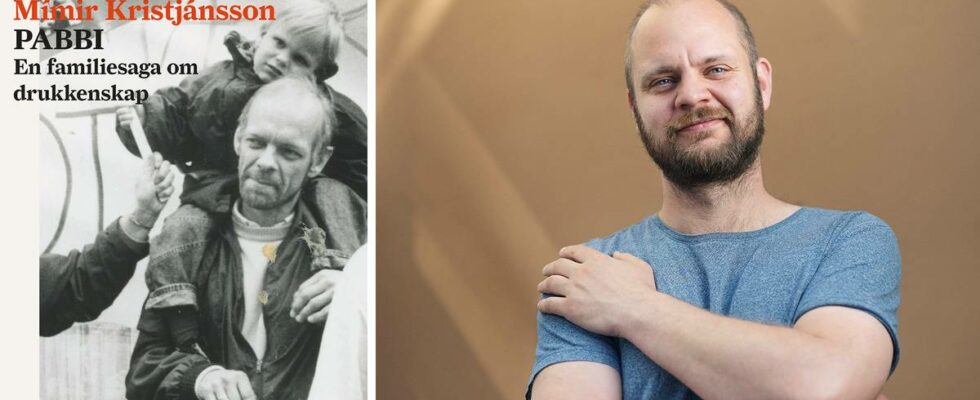Besides being a politician, podcaster and a favorite interview subject in the national media, Mímir Kristjánsson is a very productive and skilled writer. I was therefore surprised that he is also a drunkard (the author’s own words) of such dimensions that emerge in this book. For the record, I must add that I am a teetotaler, and according to Kristjánsson, we tend to be prejudiced against alcoholics. For example, we believe that they lack self-control, that they are deceitful, and that they therefore cannot have successful careers and happy families. My prejudices were perhaps not quite so caricatured, but what Kristjánsson writes afterwards is important: Mímir Kristjánsson is a Red politician, journalist and author. He grew up in Stavanger with an Icelandic father and Norwegian mother. Photo: Agnete Brun Farsarven Kristjánsson has previously written about his mother in “Mamma er trygda” where he wove his own family history together with observations about Norwegian bureaucracy and attitudes towards outsiders. This time it is the father Kristján Loftsson Guðlaugsson who is in the spotlight. One year before he died, the father gave a “cottage book” to his son. The book contained practical information about the color code of the oil stain and how to turn the heat pump on and off, but also served as the father’s personal diary. Kristján Loftsson Guðlaugsson was born in Iceland and worked as a journalist. He then moved to Norway. Photo: Kagge Forlag In several of the notes it emerged that he struggled with too much alcohol at times, and that he had to take months off to recover. According to Kristjánsson, the cottage book is a story about a man “who became increasingly lonely and desperate, and who drinks more and more frequently.” Based on the diary and his father’s alcohol problem, Kristjánsson reflects on his upbringing, but also on his own relationship with alcohol. With a family that stretches back to Egil Skallagrimsson in the 20th century, and where the stories of drunkenness are many, the author wonders if it was inevitable that he too would end up drinking? Essayist wonder Kristjánsson grapples with several dilemmas in the book. How could a father who was an alcoholic still be such a good father? Kristjánsson mostly has warm and good memories of his father. Therefore, he is afraid of letting down people who have grown up with terrible, alcoholic fathers, if he “…says with open eyes that yes, my father was an alcoholic, but no, I don’t hate him for that reason.” The author asks himself in several places whether he should stop drinking. He is looking for a clear answer, but what he finds are doubts and more questions. The grinding, probing style, which often detours to Icelandic saga history and Norse mythology, works well. By thinking aloud about themes such as fate, inheritance, and desire, but also the urge to drink, Kristjánsson writes a stream of thought that I think many people will be able to identify with. Denial of denial When Kristjánsson depicts the negative consequences alcohol has in his life, including friendships lost, love breaks, tremors, and regular bed-wetting at night, it’s startling that the author still wonders if it’s time to quit. It’s as if the insight won’t quite sink in. At the same time, denial is an important theme in the book. Kristjánsson is very aware of the tendency of alcoholics to find excuses to be able to continue: In an episode of “Trygdekontoret” about addiction, former alcoholic and now addiction researcher Trond N. Bjerke says that denial is also common among family members. When Kristjánsson asked his mother whether his father had alcohol problems, the answer was a straight no, even though she persuaded the man to go to detox. The author wonders if perhaps he also sees the memories of his father in a rosy tinge. It is difficult for others to assess, but even a theoretically “perfect father” will also have exposed his children to pain that will affect them in adulthood. It is as if the pain of life, which is present in all human lives, is not fully addressed in the text. The author states about himself: Elsewhere: But what this destruction consists in remains woolly and ends up under a veil of wonder, doubt, intellectual understanding and humor. In the end, it is the positive feelings that come out victorious, such as the joy of losing control, the sense of freedom in being able to drink in the morning, and the longing to retire with nothing to do but sit in a pub and drink. Loud and frustrating All in all, this is a fascinating book that is worth reading for many reasons. The book is both a warm portrait of a father and a personal essay on addiction written in unpretentious, effective prose. Kristjánsson effortlessly draws the reader into an obsessive reading experience. But in a way, the book is also a cry for help. It is as if Kristjánsson is putting his own life lie on display. It is both generous and bravely done, but it is also frustrating reading at times as I get the clear impression that alcohol is a significantly more destructive force in the author’s life than he himself understands – despite all assurances to the contrary. Hear Kristjánsson tell about the relationship with his father in “Sommer i P2”: news reviews Photo: Kagge Forlag Title: “Pabbi – A family saga about drunkenness” Author: Mímir Kristjánsson Publisher: Kagge/ JM Stenersens Forlag Genre: Nonfiction Number of pages: 159 Date: 15 August 2024 ISBN: 9788272018503 Published 15 August 2024, at 00.00
ttn-69
“Pabbi” by Mímir Kristjánsson – news Culture and entertainment

